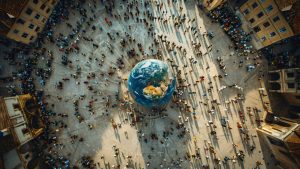
In the world of social media, the quest for popularity and wealth is, for many, a risky game full of illusions. According to research conducted by sociologist, political scientist, and anthropologist Rosana Pinheiro-Machado, a professor at the School of Geography at University College Dublin and director of the Digital Economy and Extreme Politics Lab (DeepLab), who monitored 549 influencers and 500,000 aspiring influencers on Instagram, the dream of rapid social ascension through social media is shared by millions of Brazilians. Within this sample, Pinheiro-Machado identified that, of the 25 million Brazilians working in some way on Instagram, the majority are marginalized Black women from lower social classes, facing nearly insurmountable aesthetic and technical barriers to success.
These aspiring influencers are divided into groups according to their follower count:
- Those with up to 5,000 followers generally communicate only with family and neighbors.
- From 50,000 followers, they start gaining relevance in digital marketing.
- Above 200,000 followers are the accounts considered “powerful.”
At the top of the pyramid, with more than 500,000 followers, are influencers like Pablo Marçal and Thiago Nigro, who dominate the mentorship market and promise to transform their followers’ financial lives with ready-made, profitable success methods.
The Danger of the Millionaire Influencer Network
The promise of quick and easy wealth has attracted millions of followers in Brazil, many of whom are economically vulnerable. With fewer opportunities in the formal job market, these influencers appear as supposed saviors, offering mentorships and methods for instant wealth. Pablo Marçal, for example, attracts followers willing to invest large sums in courses and mentorships—some even selling assets or using their retirement savings (FGTS) to pay for these “opportunities.” This kind of action creates a dangerous illusion where followers believe they are just one step away from changing their lives when, in reality, they end up in debt while enriching those already at the top.
The Fake World of Influencers: Reality or Illusion?
What these influencers sell, however, is more facade than reality. Most of them display a life of luxury, financial freedom, and absolute success, with mansions, sports cars, and paradise vacations. However, these images and stories are a carefully crafted illusion designed to attract followers and sell the idea of easy financial success. For many, financial success is merely a marketing strategy—and not a reality that everyone can reach. As Pinheiro-Machado points out, the product these influencers create is an empty promise based on the desire for social ascension and the fantasy of instant prosperity.
“Get-Rich” Methods: Lots of Marketing, Little Result
Among the methods offered, the famous “Launch Formula” stands out, which, as the author of this article, I have also tried. This method is nothing more than a structured marketing class, teaching how to launch products on the market. However, for this strategy to truly deliver results, it’s necessary to have a support team of writers, designers, and campaign development specialists. For those with limited access to these resources, the method becomes unfeasible, and its promise of success is hard to reach. In practice, operating as a “solo” team drastically limits the chances of success and reveals the high cost of the human resources required, something rarely discussed in digital marketing courses.
Influencers and the Risky Game of a Poorly Evaluated “Bet”
The narrative that anyone can prosper by buying get-rich courses and mentorships is widely sold, but few mention the risks. When we analyze influencers like Pablo Marçal, we see that investing in these courses is, in reality, a high-stakes gamble, where many end up in debt while the promise of success fails to materialize. Most consumers of these products lack the infrastructure or financial resources to turn the knowledge they acquire into a profitable business, making the investment in these “formulas” a poorly evaluated “bet” with a low probability of positive return.
Final Thoughts
The world of influencers has become an unregulated environment where dreams and illusions are sold without restrictions. Recognizing social media as a workplace and implementing public policies to regulate this area are essential steps to mitigate the harmful impact of this industry. For those looking to enter this field, it is crucial to be aware of the dangers and the reality that the success displayed on social media may be an illusion—and that, for the vast majority, the promised wealth-building methods are just another way to enrich those already at the top.
Sources used as references in this article:
- https://people.ucd.ie/rosana.pinheiro-machado
- https://www.uol.com.br/universa/noticias/redacao/2020/01/13/entrevista-rosana-pinheiro-machado.htm
- https://peoplesforum.org/instructor/rosana-pinheiro-machado/
- https://www.ihu.unisinos.br/184-conferencistas/581588-profa-dra-rosana-pinheiro-machado
- https://www1.folha.uol.com.br/tec/2024/10/pablo-marcal-e-excecao-ha-influencer-vendendo-carro-para-pagar-mentoria-diz-pesquisadora.shtml


